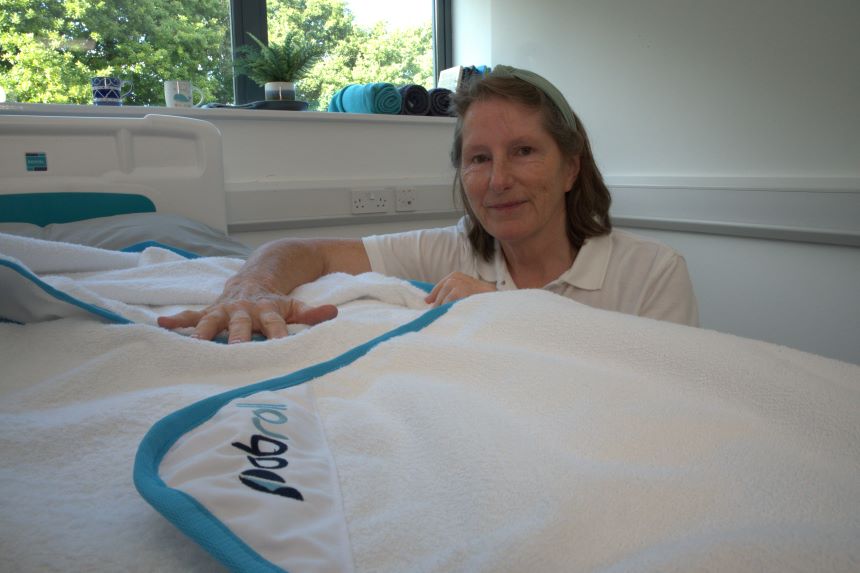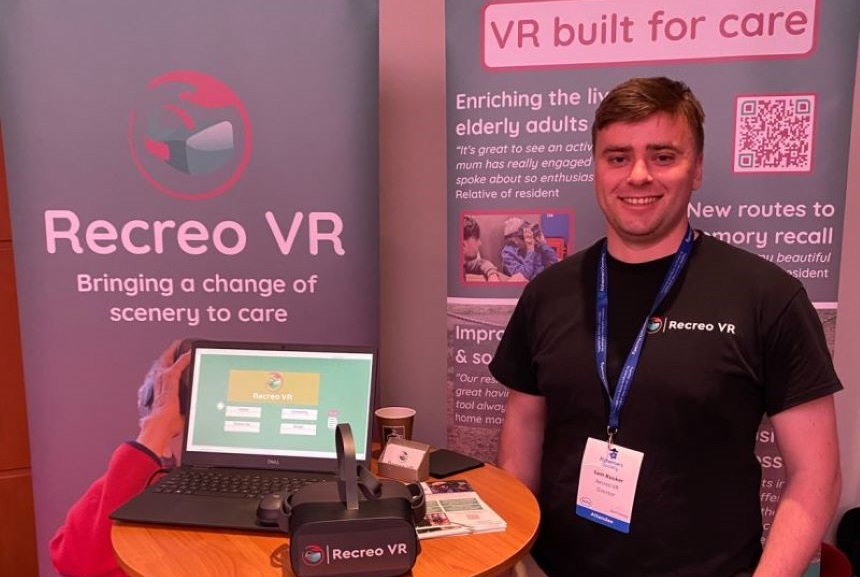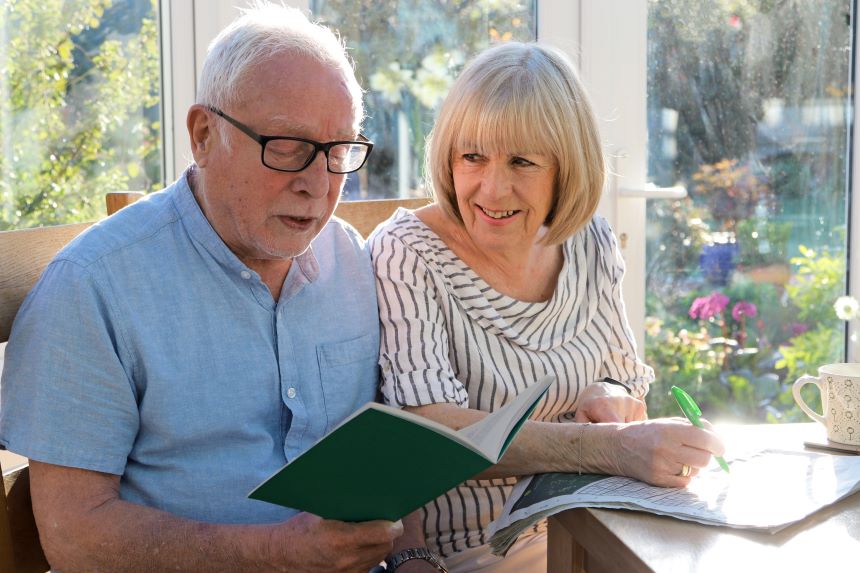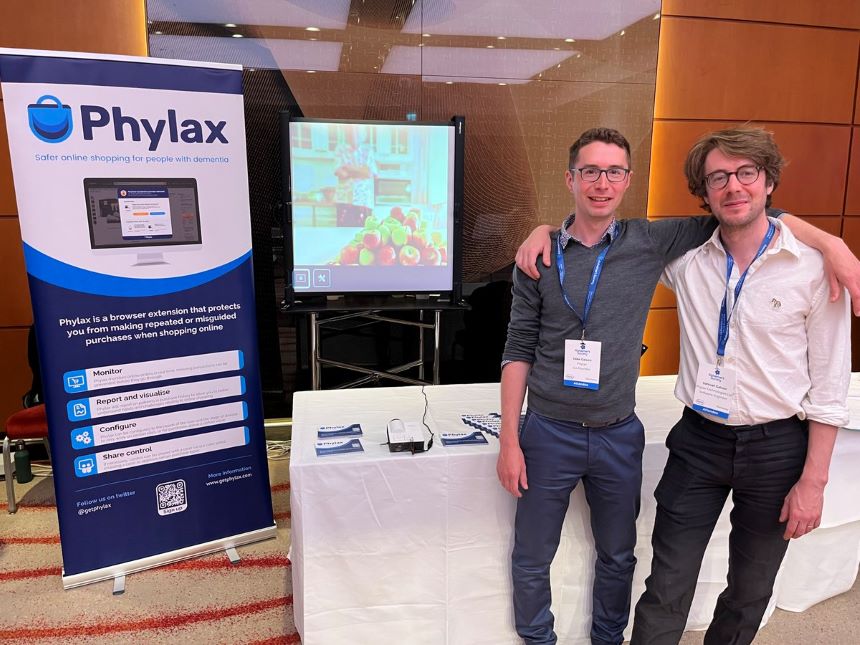Information
Five new innovations to support people living with dementia
Too many people affected by dementia face barriers in their day-to-day lives. Else London, Pobroll, Recreo VR, Cognitive books and Phylax are five new innovations we are supporting to tackle common challenges at every stage of the dementia journey
Our Accelerator Programme is designed to support people in developing and accelerating their product and service innovations to deliver help and hope to people living with dementia.
We believe that everyone with dementia should be supported to live well, from a diagnosis through to the advanced stages.

Alzheimer's Society is excited to announce our five new Accelerator partnerships. These new innovations will:
- guide people living with dementia through daily tasks of living by embedding routines to memory
- improve the user and carer experience of bed baths
- use person-centred virtual reality reminiscence experiences to improve mental and social well-being
- bring joy of reading to people living with dementia
- help people with dementia continue to shop online safely
Learn about these exciting and original innovations that our new Accelerator Partners are developing for people living with dementia.
Five new innovations to support people living with dementia
1) Else London

Guiding people living with dementia through daily tasks
Else London’s innovation aims to tackle the loss of autonomy experienced by people living with dementia due to cognitive decline. A less recognised, but equally important issue, concerns the physical and mental burden placed on carers.
The product aims to guide people living with dementia through daily tasks of living by embedding routines to memory. They have designed this system to be discreet and adapt to each user’s environment and needs using location based recognition and sensory cues. The increased autonomy for the user provided by this product ultimately allows carers to reassign their focus on other forms of care and receive reassurance.
The device, worn by the person living with dementia, actuates habit formation routines. It notifies users when they should engage in a habit and walks them through the process of navigating their routine through sensory stimulation. The device is connected to discrete spatial awareness technology to deliver prompts to the user at the right time and place, making the routines more relevant to the user’s context and mitigating confusion.
How will we be working together?
Alzheimer’s Society will be supporting Else London by organising access to people living with dementia and their carers. The project sets the aim to use regular co-creation and feedback sessions with key audiences to pivot / adjust the product features based on this insight.
2) Pobroll® 
Improving the user and carer experience of bed bath
The pobroll® is a totally waterproofed luxury bed-bathing wrap designed to improve the user and carer experience of the bed bath. For many people living with dementia, and immobile people who require personal care, the bed bath commonly causes a range of problems including the need change wet sheets, poor level of cleanliness, and carer stress. Having a proper wash and feeling clean is a basic human right, which is why they have created the pobroll®.
The pobroll® is made of two layers of high-quality soft terry-cotton with an impermeable material sandwiched between them to ensure total waterproofing. The smart-yet-simple design allows for person-centred care and is easy to use, effective, and highly adaptable. The pobroll® keeps the individual warm, dry and respectfully covered during personal washing and bathing on the bed, whilst also keeping the bed completely dry.
How will we be working together?
Alzheimer’s Society will be supporting Pobroll to streamline the manufacturing process, establish a platform and launch the pobroll®, getting this product into the hands of people living with dementia.
3) Recreo VR

Using virtual reality to improve well-being
Recreo VR want to help improve the mental and social wellbeing of people living with dementia through person centred virtual reality (VR) content, giving individuals a chance to revisit the special places of their past.
Many people living with dementia aren't able to access experiences beyond their home, care home or local area for a number of reasons. Reminiscing with a person living with dementia offers them a chance to reconnect with themselves, and loved ones. If these places and stimuli are not available, then the individual's memories, feelings and thoughts are not as easily accessible.
They aim to help people access these places and memories again through the use of virtual reality. Recreo VR have been providing VR reminiscence sessions and activities to residents in care homes over the last year and during this time have seen how person-centred experiences have the power to bring smiles to the faces of people living with dementia, and being in these environments helps bring their life stories to light.
How will we be working together?
Alzheimer’s Society will be helping Recreo VR plan and produce the Recreo Reminiscence VR content. Together with people living with dementia, we support co-creation of their app and service to ensure everyone who interacts with their headset gets the most out of the technology.
4) Cognitive Books
Bring joy of reading to people living with dementia
Cognitive Books bring the joy of reading to people with dementia – they can be enjoyed alone by a number of those with a mild-to-moderate condition – or by many with their loved ones too.
They are simple, enjoyable books with dynamic content that empower people to maintain their love of reading – and the content focuses on familiar topics that readers are passionate about. Losing the thread doesn’t matter because pages that work individually and collectively as a story – and there’s much more to enjoy and interact with than just the story itself.
Audio prototypes have been developed and e-book versions are being investigated to bring new ways to enjoy the books. These will be tested with people living with dementia. Being grounded in Cognitive Stimulation and Reminiscence Therapy means there are methods to help readers find new ways to socialise with loved ones as well as potentially improving thinking skills. The vision is that everyone living with dementia in the world who wants to or can read will have a title that brings them joy.
How will we be working together?
Alzheimer’s Society will support Cognitive Books in developing the business from its startup position, testing products with people living with dementia and supporting research design, leveraging their vast array of contacts to help overcome challenges.
4) Phylax
Continue to shop online safely
There are a growing number of individuals being diagnosed with dementia who are regular internet users. Internet access has incredible benefits, such as supporting vital social interactions, and reminding of daily tasks. However, internet for those living with dementia also comes with challenges, such as the tendency towards making repeat or misguided purchases. Currently, the only solution is to physically disconnect devices, or to revoke financial independence.
Phylax is a software that enables these individuals to continue their online activities in the confidence that Phylax will catch any mistakes before they are made. Phylax will be installed as a browser extension and will run in the background whenever you are online. It can adapt to individual needs. For example, it may be that only purchases over a certain value need to be flagged, or purchases made using certain websites.
How will we be working together?
Phylax are currently developing the beta version of their software. Alzheimer’s Society will be supporting Phylax in their co-creation journey to ensure that the needs of individuals with dementia will be met from day one.
More details to follow
We are really looking forward to partnering with Else London, Pobroll, Recreo VR, Cognitive books and Phylax in helping them to develop their inspiring innovations.
Alzheimer's Society will be supporting the partners to work together with people living with dementia, making sure their innovations are accessible and available to the people who need them most.
We will keep you updated on the progress, development and availability of these innovations in due course.
Learn about more products
Want to find out more about our previous Accelerator Programme partners? Visit our dementia innovation page for more information.
This article has been updated in May 2023 with the details of our new Accelerator Programme partners.


Janet Hutchinson
saysCaregiver
saysAnonymous
saysGood news, Caregiver - eargym is available on Android devices through Google Play: https://play.google.com/store/apps/details?id=com.app.eargym&gl=UK
Learn more about our partnership with eargym: https://www.alzheimers.org.uk/research/our-research/eargym
Visit their website: https://www.eargym.world/
We hope this helps for now.
Alzheimer's Society blog team
Peter McNeill
sayssign me up now
Simon W
saysThree great picks. All super-helpful, practical and very feasible ideas. I look forward to seeing how they all go - including getting the price of the wonderful 'Hug' down to something more affordable for most families.